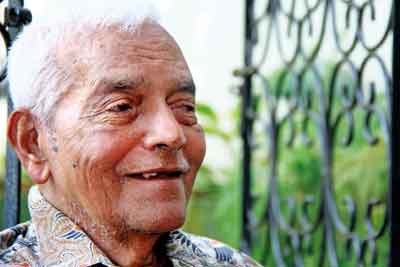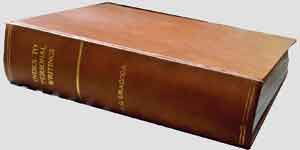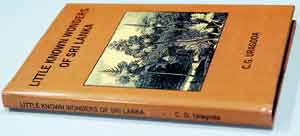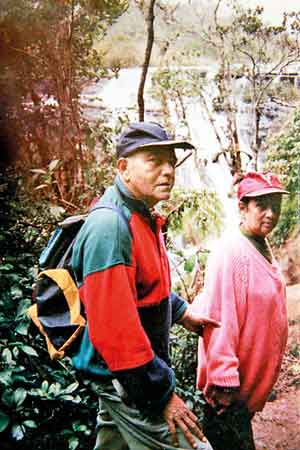Chest doc’s breathtaking canvas of life
This was just such a unique happening when ‘Respire 9’ was inaugurated a few months ago, with the prestigious C.G. Uragoda Oration on ‘The air we breathe: Its impact on our health’ being delivered by the Director of the Chest Research Foundation, Pune, India, Dr. Sundeep Salvi.

Not ready to rest on his laurels yet: Dr. Uragoda at his home in Nawala. Pix by Indika Handuwala
In the large and distinguished gathering was the stalwart of chest health Dr. Christopher Gunapala Uragoda.
It is later that we meet him in his lovely home in Nawala, where he lives with his daughter and his dog Rusty, amidst much greenery, his precious and treasured books, with a painting on an easel close-by, having frequent visitors, doctors and others who are ever-grateful for his ‘breathtaking’ contributions to chest medicine.
The firsts are many and too numerous to list…….just one being that the fish skipjack was rich in histamines and that the medication isoniazid prevents its destruction, thus increasing allergies in tuberculosis (TB) patients who are on this antibiotic.
Not limited to medicine or lung health, Dr. Chris Uragoda, the Physician, is also a prolific writer using his research ability to turn the spotlight on a range of themes including wildlife conservation, anthropology, history, culture and much more.
On that leisurely Saturday morning with a hint of rain, we walk down the pathway of life of Dr. Uragoda who has just turned 89 (his birthday was on September 22) to peek into little nooks and crannies to fathom what made him what he is.
His parents were a surveyor and a housewife and Chris was born in Hikkaduwa in his grandmother’s home. Living in Kalegana about two miles from Galle town as a boy, his early education was at Richmond College. He  would later move to Mahinda College, the second school in the colonial era to teach Buddhism, where his father had walked in the footsteps of Buddhist theosophist and first Principal F.L. Woodward.
would later move to Mahinda College, the second school in the colonial era to teach Buddhism, where his father had walked in the footsteps of Buddhist theosophist and first Principal F.L. Woodward.
We chuckle over the very Christian ‘Christopher’ name and he says that his maternal grandfather was a Methodist.
Boyhood was usual, stamp-collecting as a hobby and romping about in the village with his cousins. School-life though was not without its turbulence, for his father, after a disagreement with the Principal moved him back to Richmond College.
“Not very bright,” is how Dr. Uragoda describes his school years, even though he secured three distinctions, the highest the school had achieved at the Senior School Certificate (SSC) examination. He remembers with clarity the botany lessons under Indian Professor and rationalist Abraham Kovoor.
 The move to Colombo from Galle followed with Chris joining Ananda College for his university entrance, which he passed, clinching second place for the best results and qualifying for medical studies. He closes his eyes to get the year right and says with finality that he did the exam in 1947 and entered the University of Ceylon in 1948, passing out as a doctor in 1953.
The move to Colombo from Galle followed with Chris joining Ananda College for his university entrance, which he passed, clinching second place for the best results and qualifying for medical studies. He closes his eyes to get the year right and says with finality that he did the exam in 1947 and entered the University of Ceylon in 1948, passing out as a doctor in 1953.
To remote, lonely and malaria-rampant Pallebedda in the Ratnapura district, the young and fresh-faced Dr. Chris was sent for his first appointment as the District Medical Officer (DMO) with his duties also entailing twice weekly visits to the Embilipitiya Hospital which did not have the privilege of a Medical Officer. A stark memory is of the Pallebedda Hospital, a ‘cottage hospital’, having very few beds and being “full of messas (flies)”, while the area had only a few boutiques and a sub-post office.

Chris and Padma at Horton Plains
Here it was that he heard of elephant kraals at Panamure and also went walkabout exploring many a village and town in the south. With only part of the Sooriyawewa Road being macadamized, the journeys were by car a little distance and on foot, the balance.
Three months into battling the malaria of his patients at Pallebedda even though he had never seen a single case while at medical school, he had been informed that the Permanent Secretary would come a-visiting along with the Superintendent of TB after the inspection of a new TB hospital, three miles this side of Tissamaharama.
As he watched from the hospital quarters, the cars rolled in with the eminent visitors and after the initial greetings he was told in no uncertain terms “your hospital is dirty”, with the query what his exact post was – House Officer (HO), District Medical Assistant (DMA) or DMO?
Eleven days later, a telegram transferred Dr. Uragoda to the Colombo General Hospital where for four years he occupied the second bed in the quarters of Violet Cottage, which he shared with “my good friend” Dr. A. Wijenayake. Here their paths crossed those of Dr. Malinga Fernando, who would later become Permanent Secretary for Health, with whom blossomed a lifelong friendship. In fact, Dr. Uragoda has just completed a book on him.
While being attached to the thoracic unit of the General Hospital, the major focus of which was TB, two rooms with six beds were allocated for heart cases and he had the privilege of working with ‘greats’ such as “chest man” Dr. J.R. Wilson and Surgeon Dr. A.T.S. Paul.
Pointing out that those were the days when there was no treatment for TB patients except surgery, Dr. Uragoda says that it was mainly thoracoplasty (permanently collapsing the lungs), lobectomy (removal of a lung lobe) or pneumonectomy (lung removal), depending on the illness. Thoracoplasty was performed on 250 patients and the information went into the prestigious ‘Tubercle’ medical journal.
A tiff between the doctor-brothers, A.T.S. and Milroy Paul ensued when A.T.S. suggested to Milroy that the research paper be published in the British Journal of Surgery as he was a member of the Editorial Board and there was point blank refusal on the grounds that the paper was too long, smiles Dr. Uragoda.
The second research piece was on a surgery dealing with a right kidney which had gone high up into the chest.
It was around this time that Dr. Uragoda who was heavily into surgical procedures with his seniors was transferred as Senior HO to the medical ward of Dr. R.S. Thanabalasundaram, causing some displeasure to Dr. Wilson.
Even in the award of scholarships under the Colombo Plan there had been favouritism, with three of the five schols being given to those “close” to the top brass of the Public Service Commission of those times.
Specializing in England as a Physician, Dr. Uragoda had veered away from the surgical pathway, returning to a posting in Kandy where he worked for 11 years, with surgery going out of fashion and medications being introduced for TB.

Dr. Uragoda at the peak of Pidurutalagala in 1957 and with a Veddah in Dimbulagala in 1982
Romance had also come into his life in the comely Padma Rambukpotha, whose father was an uncontested member of the State Council. Fun times were in store in the cool climes of Kandy during the perahera, with friends and relatives converging on the home of Chris and Padma to be shepherded to seats in the King’s Hotel with a bird’s eye view of the pageant.
He laughs at the memories of the then Diyawadana Nilame stopping by, when wending his way past with the dancers and drummers in attendance, to be served a thambili, of course, it being a ‘shot’ mildly laced with whisky for a long and tiring night.
The next posting for Dr. Uragoda was as Chest Physician of both Welisara and Colombo Chest Clinics in the 1970s, two days in Colombo and the other days at Welisara.
Insidiously, TB was gaining a stranglehold on the country and Dr. Uragoda recalls those days of reckoning and how this disease spread by a bacterium was treated with streptomycin, para-aminosalicylic acid or isoniazid. However, with some cases of drug-resistant TB emerging, they faced this challenge by giving a cocktail of these medications.
Around this time, the Director of the Commission on TB, Prof. C.C. de Silva, had made some important recommendations including the introduction of the BCG vaccine.
Another of the many passions of Dr. Uragoda has been occupational medicine, while he still does research on anything and everything that takes his fancy and puts pen to paper, nay thoughts to computer on wide and varied subjects.
A large volume of his occupational medicine work had been in Kandy, after visits to small shops and grinding mills set off bouts of coughing. He has put under the microscope occupational lung diseases caused by the dust of chillie, tea, kapok, cinnamon, coir, ilmenite, asbestos and activated carbon while also studying the medical aspects of pearl fishers and the history of opium in the country.
Editor of many medical journals, this author, folklorist, historian and conservationist, Dr. Uragoda’s other papers and books include ‘The sinking of a schooner by a giant squid off Trincomalee in 1874’; ‘Sir Aldo Castellani’ (who discovered toxoplasma); ‘Sir William Kynsey and the development of healthcare in Sri Lanka’; and ‘Baron Munchausen’s fantastic adventure in Sri Lanka’.
Once again too many to mention are his honours and awards, sufficing to state that Dr. Uragoda has been bestowed the Deshabandu title by the government.
“I’m the only non-university man alive currently who has been bestowed an honorary Doctor of Science by the University of Colombo,” he smiles, adding that there were only two others, economist, civil servant and diplomat Dr. Gamani Corea and surgeon Dr. P.R. Anthonis.
Not resting on his laurels, meanwhile, he is busy with his next book which is about to go to press on capturing elephants in the days of yore, with his daily routine, after breakfast being working on the computer, then reading two newspapers and once again getting back to the keyboard till about noon. Lunch is followed by a long nap till about 5 in the evening after which it is back to the computer for about an hour, dinner and then watching the news on television before calling it a night.
A beer in the evening is also part of the routine for this widower whose beloved Padma passed away about a year ago. While his two daughters Dianthi and Neluka live in Sri Lanka, his eldest son, Lalith, who has pursued his father’s profession is in America and his other son, Dishana, in Australia.
Even after retirement at 66, he has been the pivot around which lung health has revolved as was evident at this year’s ‘Respire 9’ and after, when Dr. Uragoda seemed like a magnet attracting young and old specialists in this field.


